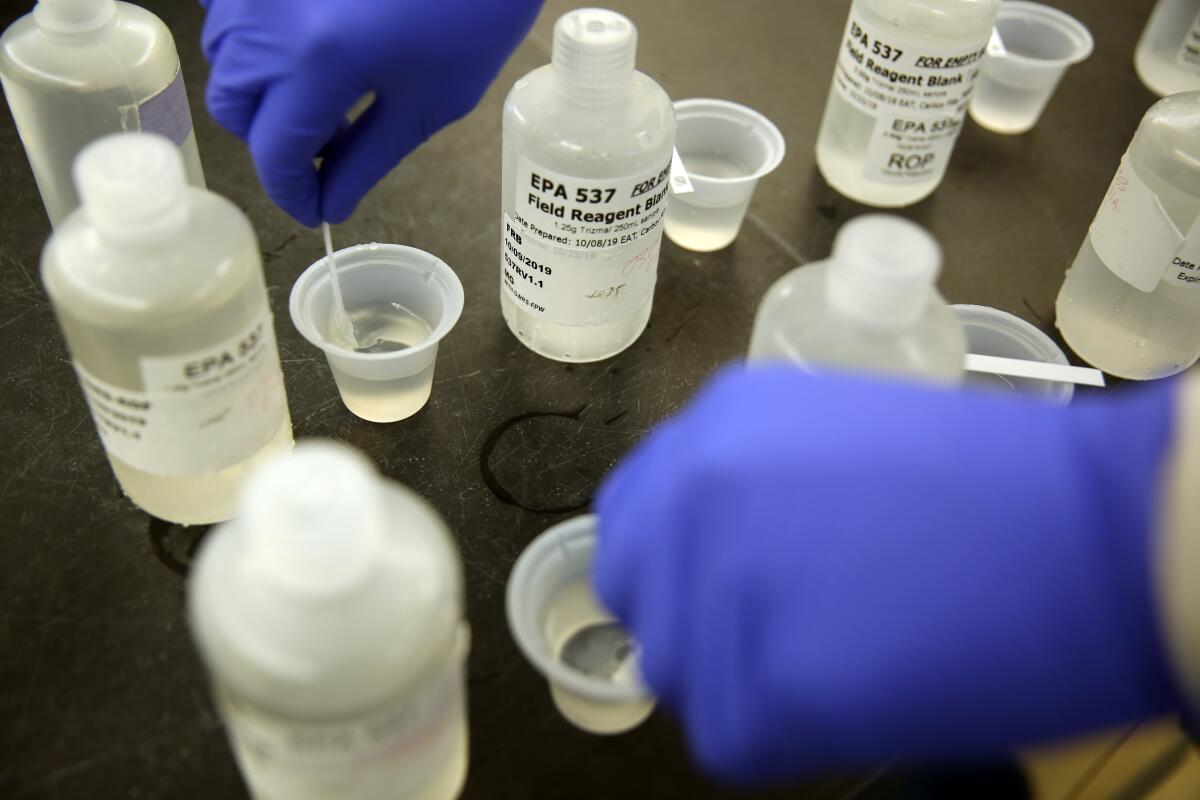California Atty. Gen. Rob Bonta sues makers of cancer-causing ‘forever chemicals’

- Share via
The state of California on Thursday sued the manufacturers of a class of chemicals known as “forever chemicals” that are found in a variety of consumer items including food packaging and cookware and are linked to cancer and other illnesses.
The chemicals at the heart of the lawsuit are perfluoroalkyl
and polyfluoroalkyl substances, commonly referred to as PFAS. They are resistant to environmental degradation, according to the Centers for Disease Control and Prevention, the Environmental Protection Agency, and hundreds of scientific studies. They have also been found in the bloodstreams of 98% of people tested, as well as in wildlife, fish, water — including rivers, lakes and nearshore waters — and soil.
“PFAS are as ubiquitous in California as they are harmful,” Atty. Gen. Rob Bonta said during a news conference in San Francisco on Thursday morning. “The damage caused by 3M, DuPont and other manufacturers of PFAS is nothing short of staggering, and without drastic action, California will be dealing with the harms of these toxic chemicals for generations.”
The suit is targeted at 20 chemical manufacturers, including 3M and DuPont de Nemours Inc.
California joins a growing list of states and municipalities that have sued over these chemicals, as well as crafted laws to ban or phase them out.
However, Bonta said this lawsuit stands out because “of this scope, size and impact” of California.
3M said in a statement that it “acted responsibly in connection with products containing PFAS and will defend its record of environmental stewardship.”
In 2021, Gov. Gavin Newsom signed two bills designed to reduce the use of PFAS in California. One prohibited the use of the chemicals in food packaging starting in 2023. It also required that cookware — such as nonstick pans — coated with PFAS carry consumer disclosures.
Another bill banned the use of the chemicals in products marketed for children, including playpens and diaper pins. Starting this year, the chemicals are prohibited in firefighting foams.
The federal government has also taken recent action, including a proposal to designate two of the more widely used chemicals as hazardous substances under the Superfund law. It is also incorporating the chemicals into its national testing programs, allowing the federal government to better understand the impacts of the chemicals and their distribution.
Bonta said the lawsuit is the result of a multiyear investigation that showed the chemical manufacturers knew about the chemicals’ dangers and violated state consumer and environment laws.
“We won’t let them off the hook for the pernicious damage done to our state,” Bonta said.
The lawsuit seeks a variety of remedies, including injunctive relief, damages, penalties, restitution and abatement.
“Water systems and their ratepayers or taxpayers should not have to pick up the tab for addressing PFAS pollution,” said Avinash Kar, senior attorney for the health and food program at the Natural Resources Defense Council.
“Those responsible for polluting our environment and our bodies with PFAS, particularly PFAS manufacturers who knew about these impacts, hid it from the public, and profited from it, should shoulder a fair share of the costs.”
More to Read
Sign up for Essential California
The most important California stories and recommendations in your inbox every morning.
You may occasionally receive promotional content from the Los Angeles Times.











